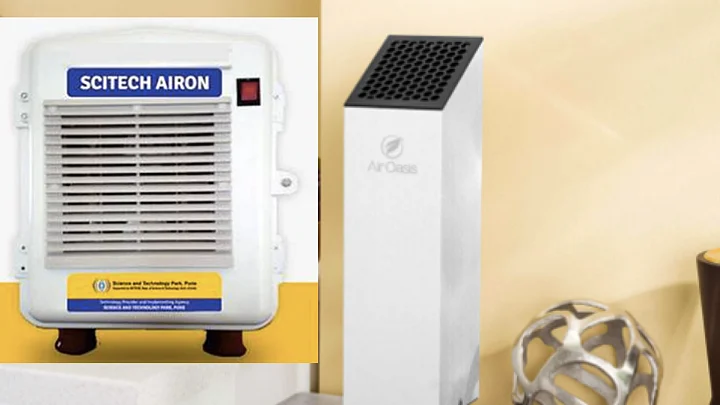Anything that could help fight the COVID-19 pandemic is welcome. And that's why there's considerable excitement around a tweet put out by the Ministry of Information and Broadcasting around an air ioniser that can fight viruses.
The ministry says a Pune-based startup has developed a technology that offers an effective solution for India's fight against COVID-19. It is a negative ion generator that can control viruses, bacteria, and fungi in closed spaces.
This ioniser called Scitech Airon was developed under the Nidhi Prayas program initiated by the Department of Science. It has been developed by an incubated company of Scitech Park in Pune and is manufactured by Pune-based JClean Weather Technologies. A grant of Rs 1 crore has been made to the company to manufacture and scale up the product, according to a post by The Information and Broadcasting Ministry.
Air ionisers are NOT new technology. They have been around for long and have often been used as filterless air purifiers in homes and cars.
Many air purifiers and some air conditioners also feature an "ion generator" or "anion" feature that releases negative ions in the air as part of the purification process.
The release from the I&B ministry claims:
"The negative ion generator titled Scitech Airon, which helps to control the virus, bacteria, and fungal infections in a closed environment, could clean up the air and disinfect areas that are exposed to the infection through COVID-19 positive cases and suspects. Hence it could ensure the wellbeing of the staff, doctors, and nurses who are working round the clock in the quarantine facilities by enhancing their disease resistance power and ability to fight the virus."
The statement also claims it has been scientifically tested in various globally renowned labs in different types of closed environments.
It claims that "One hour of operation of the Ion generator machine reduces viral load within a room by 99.7 percent depending on room size."
Is that true? How effective are ionisers? We explain.
How Does An Ioniser Work?
Ionization is a process where an atom gains or loses an electron.
An ion-generator or an ioniser releases negative ions into the air. These negative ions latch on to positive ions in the room such as dust particles, pollen, fungal spores and, of course, airborne bacteria and viruses. The increased weight of the bonded molecules make them fall to the ground or settle on surfaces faster, thus cleaning the air, but surfaces will still need to be disinfected or cleaned manually.
Have you noticed the black marks that develop near lamps or on electrical equipment in a room? That's precisely due to ionisation.
Can Ionisers Fight COVID-19?
The statement from the I&B Ministry claims Scitech Airon's ioniser can break down the proteins on the cell wall of viruses and bacteria.
"The detergent property generated by the ion generator helps in the breakdown of the outer protein of the allergens, viruses, and bacteria, which helps in controlling airborne diseases. It increases the body's resistance to infections and harmful environmental factors. This resistance could be helpful for the next 20-30 days outside the ion atmosphere. It also decomposes gaseous pollutants like Carbon Monoxide (1,000 times more harmful than Carbon dioxide), Nitrogen dioxide, and Volatile Organic Compounds."
Is this claim justified? While ionisers do bond negative ions with the cell walls of microscopic organisms like bacteria, viruses and fungi, effectively inactivating them, they should not be seen as a method to kill the virus.
Studies have shown that ionisers are fairly effective in deactivating bacteria.
The Quint spoke to a couple of medical professionals, but they advised caution in the use of ionisers alone. Personal protective equipment (PPE) is necessary for healthcare workers dealing with COVID-19 patients.
The evidence for this is weak and it shouldn’t be used as an excuse to not provide quality PPE to healthcare workers who would be taking care of COVID-19 patients.Dr Sumit Ray, Artemis Hospital
The COVID-19 coronavirus is not an airborne virus, but it is droplet transmitted. It can be contracted by contaminated surfaces. Using an ioniser would be effective in closed spaces, where it can reduce the danger of airborne transmission from people working in close proximity to each other.
However, secondary cleaning with disinfectants is necessary and for healthcare workers using PPE such as masks, gloves and overalls is of paramount importance.
